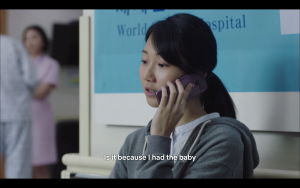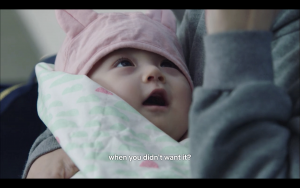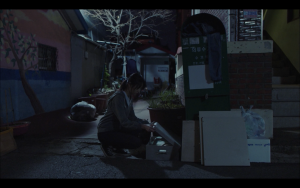Synopsis:
In episode 16 of Live, the Hongil Police force is shocked from the incident of an officer being shot in the head by a criminal. Another stabbed victim is found lying on the streets. An unmarried woman abandons her child in a box and reports to the Hongil Police force.
Discussion:
Parenting is difficult, but making the life changing decision to become a parent is even more difficult. In episode 16, aside from all chaotic situations for the police officers, viewers are introduced to a new supporting character: a lady and her newborn. The way she is presented ties back to modern contemporary issue for many women in Korea; she is first portrayed as an unwed mother who is abandoned by her boyfriend, or her newborn’s father, and is scared of her future because of the situation she is in.


In her introduction, we are able to sense the difference in perception among couples in Korea. In her call with someone who seems to be the father, we are able to retrieve 3 information about the father: whereabouts, state and his opinion on the newborn. First, where he is right now is unknown. The father and the boyfriend of the unwed mother appear to have ran off, or jam-soo-ta-da without telling the partner. Second, we know that the father did not want the baby and is understandable that he is scared but nonetheless irresponsible for he also took a role in creating the baby. Most importantly, the phone call infer us about the father’s view on the child in contrast to the mother. I think it is fair to assume that the father ran-off because the baby might change their whole lives, more likely in a bad way. Whereas, the mother seems to feel her motherly dues and her responsibility on the matter; she wants to try at least.

I see the father figure as a metaphor for the modern remaining patriarchal society within South Korea. Raising a newborn before marriage comes not only with much responsibilities but also with much more criticism, especially in Korea because it hints others that the couple has disregarded the social norm such as ‘sex before marriage’. As a result of negative social perception, additional problems, such as abandonment of newborns become apparent. Unfortunately, later in the episode, we encounter the “baby box” (ep. 16, 1:00:35). Baby box is the box that made it possible for parents to anonymously abandon their child (Chang and Cavicchi 2015).
While problems of being a single mother rise potentially due to the stress of negative social perception, it is also the potential cause of newborn abandonment. But it doesn’t end there as some of the orphans are adopted in a secret, once again due to negative social perception (Evans 2015). As this seems to be a cycle of negative influences, Korea as a society need to work toward becoming a individualistic society for them to ignore and handle situations in their own way, instead of conforming with the standard norm.
(word count: 438)
Bibliography:
Chang, Paul Y. and Cavicchi, Andrea Kim. “Claiming Rights: Organizational and Discursive Strategies of the Korean Adoptee and Unwed Mothers Movement.” Korea Observer, Vol. 46, No. 1, Spring (2015): 145-180.
Evans, Stephen. “Taking on South Korea’s Adoption Taboo.” BBC News. January 06, 2015. https://www.bbc.com/news/world-asia-30692127. (Accessed 11/9/2018)
I ask you to consider:
- Some research has shown that even 45% of the homes in America are fatherless (); yet, South Korea is in top 5 countries that send out orphans to other countries. What do these numbers imply as to the difference in two cultures and how they deal with social perception?
- The Korean law was changed so the unwanted children of unwed Korean mothers had to be registered before adoption. What are your thoughts on this change? Consider how adoption or views on adoption has changed in Korea.
- What are your thoughts on the “baby box”?
The change in Korean law requiring mothers to register their children, in my opinion, is a fantastic new law. Children have no say in whether or not they are abandoned. In many cases, whether or not being put up for adoption was the right decision, adoptees may wish to contact their birth mother. Although this is not always the case, as some adoptees may harbor anger towards their birth parents for the decision, adoptees having access to their birth information is a fundamental right, as it allows them to know their history and family lineage. Further, many children are abandoned or put up for adoption when the mother is extremely young. I have personally read many testimonies of mothers regretting their decision, though knowing it was the right choice. By registering their children, birth mothers allow a possible reconnection in the future. I can understand why some mothers may dislike this law, as they may never want to be contacted by their child in the future. However, that fact disregards the needs and rights of their children. Your child should have a right to know who you are, whether or not you were planning on having that child or wish to be responsible for them. If mothers are so concerned about being reconnected to their children, they have the option to not return any form of contact. But, with this law, children have access to make contact with their birth parents – which I believe to be a fantastic opportunity and law. (Word Count: 251)
I think the “baby box” system is a good system to protect unwanted babies and give them shelter. However, due to people utilizing this system to their own goods, many are thinking negative about the “baby box”. Originally “baby box” was made so that people with circumstances such as finances or people’s negative views, where they are really unable to raise the baby to put them into a safe place rather than discarding the baby outside on the street or in the dumpster. When the baby is sent to the “baby box”, the founder of the box would take care of that child with volunteers that are willing to help. Without the “baby box” I think many children that were discarded would have lost their lives. I personally believe that the increase of parents discarding children are not because of the “baby box”, but the way they are using it negatively or for their selfishness. I think as long as there are these kinds of people, these wonderful system or facilities made with good intentions to help the society will be used wrongly and portray negative images to the world. Because of these factors some of these systems are being rid of and getting harder to initiate similar or new system.
In Dr. Saeji’s lecture, we did find out that Korea is one of the countries where send out orphans to other countries the most. Also, in my point of view, it was shocking how other countries, mostly North America, accept children even with disabilities. It is sad knowing the fact that young teenagers, who are not able to raise a child after giving birth, simply put them into the baby box, where they do not ask anything about the child or the mother/father. I still do not know if the baby box is a good thing or a bad thing because there are always pros and cons about every aspect. I guess the baby box is a good thing for the teenagers who have made a life mistake and gave a birth to a child. However, the bad thing about the baby box would be that it is making the teenagers or the young mothers to abandon their babies easily. But thinking as if I was in one’s position, of course it would be so hard to abandon a baby after giving birth but the look of a single mother in Korean society would be a worst scenario. I saw some news about the single mothers committing suicides with their babies after giving birth… It is tragic that they do not have anyone to support them both mentally and physically. Baby box can be one of the ways out for the young parent. I just feel sad for both newborn babies and the young parent. I don’t know if it is a fact where you only criticize the parent; the society itself does not welcome the single parent. Therefore, I believe that it is a hard issue to talk whether the baby box is a good or bad thing.
South Korea is one of the countries of sending orphans overseas most, although North America has high rate of single-mother as Lucius and Dr. Saeji said. It means that Koreans mostly refuse to be a single mother or single father. There are the reasons of being single mother are varied, but I guess the most reason of being single mother is teen pregnancy. Korean society still has negative perception towards single mother or father because Korea is one of the patriarchal countries. Particularly, many Korean people have negative perception on teen single mothers or fathers, so they obliged to give up their children. However, abortion in Korea is illegal, so they give birth and abandon or send them overseas. Also, there is “baby box” in Korea, and this is a way instead of sending overseas. I think “baby box” has both advantage and disadvantage, but personally I think that it has more negative things. For the advantage, single mother or fathers, especially teens, can give up their children without the complex process of sending overseas. On the other hand, for the disadvantage, it is happened without any formal documentation, so the information of the abandoned baby may be not accurate, and when baby is grown up and try to find their biological mothers or fathers, they may be hardly find them. In addition, I think that people abandon their children easier due to “baby box” system because baby box does not require them formal documentation or complex process. It is just happened people walk there and abandon, so the rate of abandoning children may go higher. Thus, the Korean government considers more about baby box system.
The perception towards Baby Box are very divided. While some may perceive the system to be a negative influence that promotes abandonment, others also view it as a way to help abandoned babies. In the Korean culture, having a child while unmarried or underage has negative stigmatization. However, the society must realize that not all unplanned pregnancies are due to improper use birth control, education, or simple mistakes. There are uncontrollable cases like rape that unwillingly forces women to have unplanned babies. To those who are not capable or in a situation where raising a baby is near impossible, Baby Box is one of the only solutions that women can depend on. I think it would be a great implementation if Korea could use more resources towards helping women with these type of situation and provide more services like counselling and Nurse Family Partnership that the U.S. has. With help and support through human interactions, I think we can drastically lower the number of abandoned babies.
166
Hi Lucius,
Thank-you for posting your blog discussion. Although I’m from another group (DotS), I hope that I can help stimulate discussion.
I’d like to answer your first question with the idea that social perception within South Korea needs to change. It can be assumed that South Korea has conflicting ideas when it comes it’s first world perception but normalized backwardness. It’s a country that is ethno-nationalistic and this isn’t an isolated idea, but is deeply ingrained with the fabrication of Korean values. Children that can’t be a “morally upright citizen” are generally discarded. I’m speaking specifically those with disability because of the negative connotations attached and the severely lacking education and laws on disability. These individuals are often considered burdens of society which creates backlash on them and those around them.
In consideration of your second and third question about the new law, I feel that it can be controversial. Your group member, Sophie has pointed out that it’s the fundamental right of the child to have information about their biological parents which I agree. However, I do feel that it can be more complicated as it involves paperwork and can debunk the “baby box” invention. The baby box is meant for those generally in poor circumstances to give their children an opportunity outside of the situation they are born in. South Korea as a society can be incredibly scrutinizing to individuals in these situations. I feel that the “baby box” provides a safe “anonymity” to the women who are giving up their parental rights for whatever reason it may be. It can be complicated with registration, though it’s incredibly important. South Korea has an issue with the citizen being “morally upright” regardless of the circumstances in which the “baby box” has attachments of negative connotation. These women being considered “lazy” or “selfish” and these children from the beginning considered “abnormal” as a result of their birth and upbringing. What needs to be changed is the social perception. Hopefully, it will start with laws being introduced to protecting these women and children within the system without judgment and proper anonymity. South Korea is still in the process of legalizing abortion, however the progress is slow which is why the baby box is integral for the safety of those who use them or are put in them.
Hey all,
I think Cheka has brought up an interesting counter argument with regards to the anonymity of the women and of the parentage of the child – how much will it affect the child’s future to know or not know whom the birth parent was, as opposed to what kind of family they were adopted into? I think the group’s responses are quite insightful – thank you for sharing.